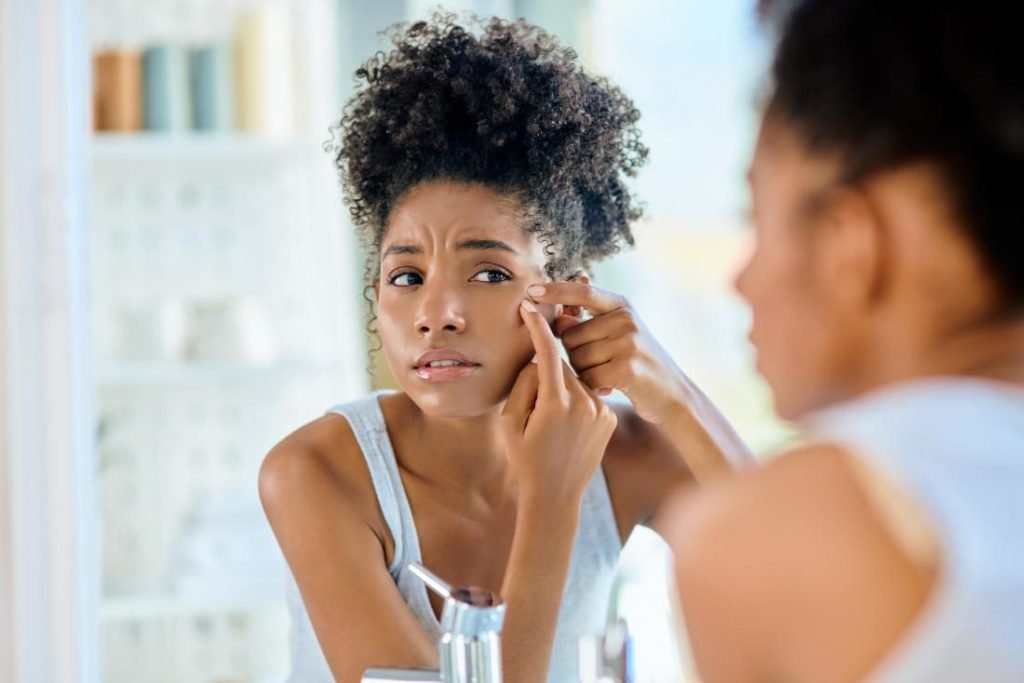We Just Found the Reason Why You May be Having Stubborn Acne…and it’s PCOS!

If you’re wondering how to treat PCOS acne, we have some great advice for you.
But first thing’s first, let’s break down what PCOS is. Polycystic Ovary Syndrome (PCOS) is a hormonal disorder that is common among females of reproductive age. People with PCOS can have a wide range of symptoms and clinical signs. Acne, a very pertinent symptom, affecting 10-34% of people who have the condition.
Today, one of our main goals is to help you understand the link between PCOS and acne, and help you treat & manage it.

Does PCOS directly cause Acne?
A person with PCOS may experience acne because of the release of hormones called Androgens. One of the key features of PCOS is high levels of this hormone being produced. Doctors call this Hyperandrogenism.
Androgens play an important role in the development of acne. They cause the glands in the skin to produce an excess of an oily substance called sebum. Acne occurs when sebum and dead skin cells build up inside hair follicles, trapping bacteria beneath the skin. This leads to inflammation and the formation of pimples.
Someone with PCOS may develop acne in various areas, including the face, neck, chest & upper back.
Other issues linked with PCOS include;
- Metabolic syndrome
- Obesity
- Impaired glucose tolerance
- Type 2 diabetes
- Cardiovascular risk
- Depression
- Obstructive sleep apnea
- Non-alcoholic fatty liver disease
How to Treat PCOS Acne
Some oral contraceptive pills can treat acne that results from PCOS. The combination of Estrogen and Progesterone in these pills reduces levels of Testosterone in the body.
A reduction in testosterone limits the development of acne and hirsutism.
Now, not all oral contraceptives are equally able to treat acne caused by PCOS. Two types of Progesterone called Cyproterone Acetate and Drospirenone block the effect of Androgens and work particularly well for this purpose.
According to Health line, researchers, have found a 30–60% reduction in inflammatory acne within 3–6 months of oral contraceptive therapy. They estimate that 50–90% of people who receive this treatment see an improvement in acne lesions.
Two other medications, called Spironolactone and Flutamide, may also treat acne and hirsutism caused by PCOS.
However, the Food and Drug Administration (FDA) has not approved them for these uses, so a doctor would be prescribing them on an off-label basis.
Tips for Managing Acne
Doctors recommend that people with PCOS-induced acne follow general advice about caring for their skin and preventing breakouts, such as:
• You should wash the face twice a day and after sweating.
• Try to avoid scrubbing the skin.
• Apply a non-abrasive cleanser with the fingertips, as opposed to a washcloth or sponge.
• Ensure you rinse the skin thoroughly with lukewarm water.
• Stay away from touching, squeezing or popping pimples.
• Avoid excess sun exposure, including tanning beds.
If this article hasn’t been helpful, take a look at some other advice we’ve shared on treating acne here.
Photo Credit: Medical News Today |
Sign Up to Our Newsletter
Get notified about exclusive offers every week!









